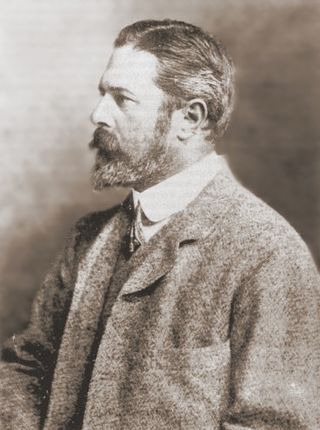Tallage or talliage may have signified at first any tax, but became in England and France a land use or land tenure tax. Later in England it was further limited to assessments by the crown upon cities, boroughs, and royal domains. In effect, tallage was a land tax.

The Encyclopædia Britannica Eleventh Edition (1910–1911) is a 29-volume reference work, an edition of the Encyclopædia Britannica. It was developed during the encyclopaedia's transition from a British to an American publication. Some of its articles were written by the best-known scholars of the time. This edition of the encyclopaedia, containing 40,000 entries, has entered the public domain and is easily available on the Internet. Its use in modern scholarship and as a reliable source has been deemed problematic due to the outdated nature of some of its content. Modern scholars have deemed some articles as cultural artifacts of the 19th and early 20th centuries.

The Kingdom of France was organised into provinces until the National Constituent Assembly adopted a more uniform division into departments (départements) and districts in late 1789. The provinces continued to exist administratively until 21 September 1791.
Ship money was a tax of medieval origin levied intermittently in the Kingdom of England until the middle of the 17th century. Assessed typically on the inhabitants of coastal areas of England, it was one of several taxes that English monarchs could levy by prerogative without the approval of Parliament. The attempt of King Charles I from 1634 onwards to levy ship money during peacetime and extend it to the inland counties of England without parliamentary approval provoked fierce resistance, and was one of the grievances of the English propertied class in the lead-up to the English Civil War.

In the civil service of the United Kingdom, His Majesty's Exchequer, or just the Exchequer, is the accounting process of central government and the government's current account in the Consolidated Fund. It can be found used in various financial documents including the latest departmental and agency annual accounts.

Scutage was a medieval English tax levied on holders of a knight's fee under the feudal land tenure of knight-service. Under feudalism the king, through his vassals, provided land to knights for their support. The knights owed the king military service in return. The knights were allowed to "buy out" of the military service by paying scutage.

The Ministry of Agriculture, Fisheries and Food (MAFF) was a United Kingdom government department created by the Board of Agriculture Act 1889 and at that time called the Board of Agriculture, and then from 1903 the Board of Agriculture and Fisheries, and from 1919 the Ministry of Agriculture and Fisheries. It attained its final name in 1955 with the addition of responsibilities for the British food industry to the existing responsibilities for agriculture and the fishing industry, a name that lasted until the Ministry was dissolved in 2002, at which point its responsibilities had been merged into the Department for Environment, Food and Rural Affairs (Defra).

Charles Townshend was a British politician who held various titles in the Parliament of Great Britain. His establishment of the controversial Townshend Acts is considered one of the key causes of the American Revolution.
Angaria was a sort of postal system adopted by the Roman imperial government from the ancient Persians. According to Xenophon, the Persian system was established by Cyrus the Great. Couriers on horseback were posted at certain stages along the chief roads of the empire, for the transmission of royal dispatches by night and day in all weather.

Octroi is a local tax collected on various articles brought into a district for consumption.

Ernest William Lyons Holt or E. W. L. Holt was an English marine naturalist and biologist who specialized in ichthyology, the study of fish. His work helped lay a scientific foundation for the fishery management in Ireland, and together with William Spotswood Green, he strongly influenced the development of the Irish Fisheries in its early years.
Robert Dudley Baxter was an English economist and statistician.
Bagimonds Roll was a roll used for taxation in Scotland. In 1274 the council of Lyons imposed a tax of a tenth part of all church revenues during the six following years for the relief of the Holy Land. In Scotland, Pope Gregory X, entrusted the collection of this tax to Master Boiamund de Vitia, a canon of Asti, whose roll of valuation formed the basis of ecclesiastical taxation for some centuries.
A freestone is a type of stone used in masonry for molding, tracery and other replication work required to be worked with the chisel. Freestone, so named because it can be freely cut in any direction, must be fine-grained, uniform and soft enough to be cut easily without shattering or splitting. Some sources, including numerous nineteenth-century dictionaries, say that the stone has no grain, but this is incorrect. Oolitic stones are generally used, although in some countries soft sandstones are used; in some churches an indurated chalk called clunch is employed for internal lining and for carving.
Fescennia or Fescennium was an ancient city of Etruscan/Faliscan origin, which is probably to be placed immediately to the north of the modern Corchiano, 6 miles (9.7 km) north west of Civita Castellana, in central Italy. The Via Amerina traverses it. At the Riserva S. Silvestro, walls exist. At Corchiano itself, however, similar walls may be traced, and the site is a strong and characteristic triangle between two deep ravines, with the third (west) side cut off by a ditch. Here, too, remains of two bridges may be seen, and several rich tombs have been excavated.
Vill is a term used in English, Welsh and Irish history to describe a basic rural land unit, roughly comparable to that of a parish, manor, village or tithing.

Bihar and Orissa was a province of British India, which included the present-day Indian states of Bihar, Jharkhand, and Odisha. The territories were conquered by the British in the 18th and 19th centuries, and were governed by the then Indian Civil Service of the Bengal Presidency, the largest administrative subdivision in British India.
Taxes in India are levied by the Central Government and the State Governments by virtue of powers conferred to them from the Constitution of India. Some minor taxes are also levied by the local authorities such as the Municipality.
Service tax was a tax levied by the Government of India on services provided or agreed to be provided excluding services covered under the negative list and considering the Place of Provision of Service Rules 2012 and collected as per Point of Taxation Rules 2011 from the person liable to pay service tax.

On Conoids and Spheroids is a surviving work by the Greek mathematician and engineer Archimedes. Consisting of 32 propositions, the work explores properties of and theorems related to the solids generated by revolution of conic sections about their axes, including paraboloids, hyperboloids, and spheroids. The principal result of the work is comparing the volume of any segment cut off by a plane with the volume of a cone with equal base and axis.









